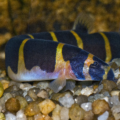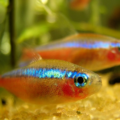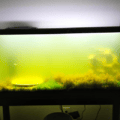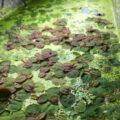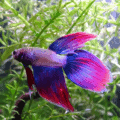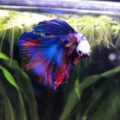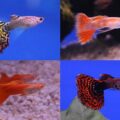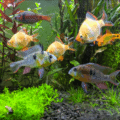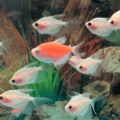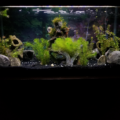Discus fish are renowned for their beauty and elegance, making them a popular choice among aquarium enthusiasts. However, many potential owners may wonder about the temperament of these fascinating creatures. In this article, we will explore the behavior of Discus fish, their natural habitat, factors that influence aggression, signs of aggressive behavior, and effective strategies for managing and preventing aggression in Discus fish.

Understanding Discus Fish Behavior
Discus fish, scientifically known as Symphysodon, are native to the Amazon Basin in South America. In their natural habitat, they thrive in calm and acidic waters. These fish exhibit a peaceful temperament, but it is important to note that they still possess some degree of aggression due to their classification as cichlids.
Discus Fish Temperament
While Discus fish are generally peaceful, they can display moderate aggression, especially during breeding or territorial disputes. It is crucial to understand their behavior to ensure a harmonious tank environment.
Natural Habitat
Discus fish are often found in large groups in their natural habitat. They are social creatures that enjoy the company of their own kind, and their behavior can be influenced by the presence of other Discus fish.
In a group of Discus fish, there is usually a dominant pair that establishes and defends its territory. Other fish within the group establish a hierarchical order, which can lead to occasional conflicts.
Understanding Discus Aggression
Discus fish, those majestic beauties of the tropical fish world, can exhibit varying levels of aggression. If you’re setting up a discus tank and have only two discus, it’s likely you’ll see some aggressive discus behavior, especially when introducing new discus. A dominant fish will often assert itself, establishing a pecking order. This aggression might continue for about a week until the fish settle into their new environment.
Whenever possible, introduce a group of discus of the same size to minimize aggression. Also, be mindful when including other community fish; while peaceful, discus, especially blue diamond, may show discus aggression if they feel threatened or crowded.

Factors Influencing Aggression in Discus Fish
Several factors can contribute to aggression in Discus fish, which include tank size and space, water quality, and feeding regimen.
Tank Size and Space
Insufficient tank space can lead to heightened stress levels among Discus fish, resulting in aggressive behavior. Providing a spacious environment is essential to minimize territorial disputes and promote a harmonious atmosphere.
Water Quality
Poor water quality can lead to increased stress levels in Discus fish, making them more prone to aggression. Regular water changes and maintaining appropriate water parameters are vital in keeping them healthy and content.
Feeding Regimen
Discus fish are known to be particular about their diet. Inadequate or inappropriate feeding practices may create competition for food and trigger aggressive behavior. Ensuring a balanced and varied diet is essential for their well-being.

Signs of Aggressive Behavior in Discus Fish
Being able to identify signs of aggression in Discus fish is crucial for maintaining a peaceful aquarium environment.
Nipping and Chasing Behavior
Aggressive Discus fish may exhibit nipping and chasing behaviors towards tank mates, especially if they feel threatened or if there is competition for food or territory.
Aggression towards Tankmates
If Discus fish are incompatible with their tank mates, they may display aggression by attacking or bullying other fish in the aquarium. It is important to choose compatible species and introduce them gradually to minimize conflicts.
Territorial Display
Discus fish may showcase territorial behavior by defending specific areas of the tank from intruders. This can involve flaring fins, aggressive posturing, and even physical confrontations.

Managing and Preventing Aggression in Discus Fish
Creating a harmonious environment for Discus fish involves tackling the potential causes of aggression and implementing effective management strategies.
Providing Adequate Tank Space
Choose a spacious aquarium that allows each fish to establish its territory and reduces competition for limited resources. A general rule of thumb is to have at least 10 gallons of water per Discus fish.
Maintaining Optimal Water Parameters
Regularly test water parameters and maintain appropriate levels of pH, temperature, and hardness. Proper filtration and water changes will also help reduce stress and minimize aggression.
Proper Feeding Techniques
Ensure all fish receive an adequate and well-balanced diet. Feed them multiple times a day, offering a variety of high-quality pellets, flakes, and frozen foods. This will help alleviate aggression caused by competition over food.

Tips for Managing Discus Tank Harmony
While discus aggression may seem concerning, it’s usually a natural part of their social behavior. Often, this displays as chasing or fin nipping, but rarely results in serious injury. Also, If you’re setting up a discus tank with only two discus, you’re likely to see some agressive discus behavior, especially when introducing new discus.
To reduce aggression, ensure your tank is large enough and provides ample hiding spots with plants or decorations. A spacious environment helps to diffuse tension. Regular feeding with high-quality food also minimizes competition and promotes a more peaceful discus tank.

Tips for Introducing Discus Fish to Tankmates
When introducing Discus fish to new tankmates, following proper procedures will increase the likelihood of a smooth integration.
Quarantine Procedures
Before introducing new fish, it is essential to quarantine them to prevent the spread of diseases. This helps ensure that the newcomers are healthy and free from any potential illnesses.
Compatibility with Other Fish Species
Research the compatibility of potential tankmates with Discus fish. Avoid aggressive or fin-nipping species and opt for calm and peaceful fish that are compatible with the Discus fish’s temperament.
Proper Acclimation Process
When adding new fish to the tank, acclimate them slowly by allowing the water temperatures to equalize. This will lessen stress and minimize the likelihood of aggressive behavior.
Conclusion
Discus fish, known for their beauty and grace, can display moderate aggression due to their cichlid nature. Understanding their behavior, identifying signs of aggression, and implementing effective strategies for managing and preventing aggression are vital for maintaining a harmonious aquarium environment.
By providing adequate tank space, maintaining optimal water parameters, and following proper feeding and introduction techniques, you can enjoy the company of these stunning fish while keeping aggression at bay.

